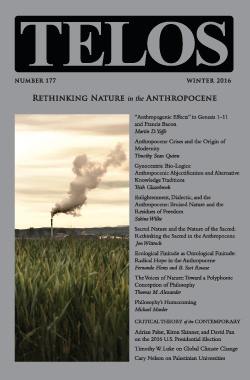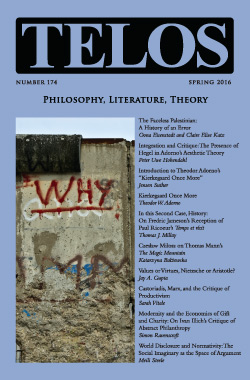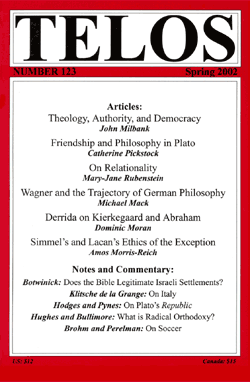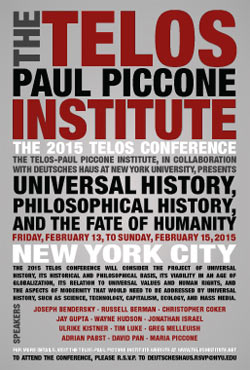By Aidin Keikhaee · Friday, January 6, 2017 In this essay I attempt to sketch out the possibility of a response to the problem of the relation between ethics and politics in Emmanuel Levinas’s philosophy. Levinas’s ethics as first philosophy is revolutionary, and promising, but it leads to a gap between ethics and politics. This is a genuine problem, since depending on how one problematizes this gap and responds to it, one may end up with different, even opposing, views of Levinas’s thought, ranging from the right side of the political spectrum to its very left. In order to respond to this problem, I examine the possibility of a constructive dialogue between Levinas’s ethics and Adorno’s negative dialectics. In particular, I approach the relation between ethics and politics in Levinas from the standpoint of the question of history.
Continue reading →
By Jon Wittrock and Richard Polt · Monday, December 12, 2016 Telos 177 (Winter 2016) is now available for purchase in our store.
 While the term Anthropocene was used in the USSR already in the 1960s to refer to the late Quaternary era, it rose to prominence more recently when introduced by Eugene F. Stoermer and Paul J. Crutzen. As the very word indicates, this is an epoch when humanity has taken center stage in the sense that its activities now have a major, global, and lethal impact. The shadow of human-caused global destruction and mass death haunts this epoch, and indeed, humanity’s newly acquired capacity for devastation is one of the Anthropocene’s most marked traits. While mass extinctions are hardly new phenomena and while the specter of the extinction of humanity due to some sudden catastrophe was there even before human beings were aware of it in scientific terms, the actual capacity of humanity to extinguish itself along with a large swath of other species on the planet is new, and the stakes of human action are higher. While the term Anthropocene was used in the USSR already in the 1960s to refer to the late Quaternary era, it rose to prominence more recently when introduced by Eugene F. Stoermer and Paul J. Crutzen. As the very word indicates, this is an epoch when humanity has taken center stage in the sense that its activities now have a major, global, and lethal impact. The shadow of human-caused global destruction and mass death haunts this epoch, and indeed, humanity’s newly acquired capacity for devastation is one of the Anthropocene’s most marked traits. While mass extinctions are hardly new phenomena and while the specter of the extinction of humanity due to some sudden catastrophe was there even before human beings were aware of it in scientific terms, the actual capacity of humanity to extinguish itself along with a large swath of other species on the planet is new, and the stakes of human action are higher.
Continue reading →
By Russell A. Berman · Monday, March 14, 2016 Telos 174 (Spring 2016): Philosophy, Literature, Theory is now available for purchase in our store.
 In this issue, Telos turns to a diverse set of philosophers, contemporary and classical, and questions, concerning ethics and politics on the one hand, and literature and aesthetics on the other. More often than not, those distinctions turn out to be difficult to maintain. A case in point is the opening essay, which examines how statements by Levinas have been subjected to political readings in order to impute to him positions that he did not hold. What are the ethics of intentional misreadings? In their meticulously argued analysis, Oona Eisenstadt and Claire Elise Katz demonstrate how the philosopher’s comments in a 1982 radio interview, in the immediate aftermath of the massacres in the Sabra and Shatila refugee camps in Lebanon, have been subjected to increasing degrees of misrepresentation, culminating in false accusations that he justified the killings. These insinuations involved fabricating quotations to put words in his mouth. Eisenstadt and Katz expose the poor philology and tendentious politics implicit in such distortion. In this issue, Telos turns to a diverse set of philosophers, contemporary and classical, and questions, concerning ethics and politics on the one hand, and literature and aesthetics on the other. More often than not, those distinctions turn out to be difficult to maintain. A case in point is the opening essay, which examines how statements by Levinas have been subjected to political readings in order to impute to him positions that he did not hold. What are the ethics of intentional misreadings? In their meticulously argued analysis, Oona Eisenstadt and Claire Elise Katz demonstrate how the philosopher’s comments in a 1982 radio interview, in the immediate aftermath of the massacres in the Sabra and Shatila refugee camps in Lebanon, have been subjected to increasing degrees of misrepresentation, culminating in false accusations that he justified the killings. These insinuations involved fabricating quotations to put words in his mouth. Eisenstadt and Katz expose the poor philology and tendentious politics implicit in such distortion.
Continue reading →
By Panajotis Kondylis · Monday, November 23, 2015 The following article was originally published in the Greek newspaper To Vima on December 21, 1997, on the occasion of the 70th anniversary of the first publication of Martin Heidegger’s Being and Time.
I consider Being and Time to be one of the overrated books of the century. To be precise, I regard it as a collection of platitudes expressed in pretentious and obscure language. Whoever goes beyond the narrow philosophical perspective and surveys the history of ideas and problems in its totality arrives at this conclusion. Being very one-sidedly educated as a rule, philosophers usually inflate the importance of things that take place in their own field and consider an author original solely because he introduces them to one or two new concepts. In reality, the philosophy of the Modern Era did not create its own problematic but followed, directly or indirectly, in a better or worse manner, the rapid changes that occurred chiefly in the natural sciences to begin with, and subsequently in the social and human sciences. The epistemologically oriented philosophy of the subject was developed in the seventeenth and eighteenth centuries as an attempt to provide answers to questions raised by the mathematical physics of the time (the distinction between primary and secondary qualities, causality, substance). The social and human sciences, whose foundations were laid in the eighteenth century and which came into their own in the nineteenth, introduced a perspective that has proven fatal for philosophy’s vital myth, namely, that of the autonomy of spirit, since they demonstrated its dependence not only on “irrational” and “existential” factors but on “non-spiritual,” socioeconomic, and historical ones too.
Continue reading →
By Kyle Nicholas · Thursday, October 22, 2015  Mention “Radical Orthodoxy” in a room of people who are either quite intimately or only remotely acquainted with contemporary theology, and one surely will receive equal parts of praise and scorn. Whether it is being praised or scorned, however, it is plain that Radical Orthodoxy has worked its way deep into the fabric of contemporary theological discourse. Since the publication of John Milbank’s Theology and Social Theory in 1992, Catherine Pickstock’s After Writing in 1997, and Radical Orthodoxy: A New Theology, edited by Milbank, Pickstock, and Graham Ward in 1998, the Radical Orthodoxy movement has done what any explosively innovative intellectual movement will do after the hype settles down: mature or wither away. Mention “Radical Orthodoxy” in a room of people who are either quite intimately or only remotely acquainted with contemporary theology, and one surely will receive equal parts of praise and scorn. Whether it is being praised or scorned, however, it is plain that Radical Orthodoxy has worked its way deep into the fabric of contemporary theological discourse. Since the publication of John Milbank’s Theology and Social Theory in 1992, Catherine Pickstock’s After Writing in 1997, and Radical Orthodoxy: A New Theology, edited by Milbank, Pickstock, and Graham Ward in 1998, the Radical Orthodoxy movement has done what any explosively innovative intellectual movement will do after the hype settles down: mature or wither away.
In their article “What is Radical Orthodoxy?” (Telos 123, Spring 2002), John Hughes and Matthew Bullimore map out, in a short space and yet with crisp detail, the main themes in the Radical Orthodoxy project. For those familiar with the movement, their points will not come as a shock: that a deep metaphysical violence underlies modernity, political liberalism, and capitalism; that the philosophical and theological dualisms of modernity must be named and then overcome with the aid of both premodern and postmodern thought; and that in the face of proliferating violence it is Christian orthodoxy—in line with Aquinas, Boethius, Augustine, Gregory of Nyssa, and Iamblichean Neo-Platonism—that presents truly “radical” alternatives to the prevailing political, philosophical, and theological orders.
Continue reading →
By Jay A. Gupta · Monday, March 30, 2015  Hegel’s lectures on the philosophy of history chart the development of free, reflective self-conscious selves, but what exactly does that mean? For skeptics, it doesn’t mean much, as Hegel notoriously appears to ground this development in the development of the state. This has inspired Popper’s well-known accusations that Hegel was a puppet of the Prussian monarchy, the “enemy of the open society,” etc., etc., and that the “free” subjects of the state as Hegel describes it are anything but. Further, from Marx to Habermas, Hegel is indicted as one who adopts a quietist attitude of priestly monasticism, so while those imbued with the proper critical, historical consciousness are busy trying to change the world according to the dictates of one or another praxis philosophy, Hegel is content to contemplate it as it goes up in flames. Habermas sees in Hegel’s mature work a “blunting of critique” and a “stoic retreat” from the problems of modernity, the very ones that Habermas believes the younger Hegel so incisively diagnosed. Hegel’s lectures on the philosophy of history chart the development of free, reflective self-conscious selves, but what exactly does that mean? For skeptics, it doesn’t mean much, as Hegel notoriously appears to ground this development in the development of the state. This has inspired Popper’s well-known accusations that Hegel was a puppet of the Prussian monarchy, the “enemy of the open society,” etc., etc., and that the “free” subjects of the state as Hegel describes it are anything but. Further, from Marx to Habermas, Hegel is indicted as one who adopts a quietist attitude of priestly monasticism, so while those imbued with the proper critical, historical consciousness are busy trying to change the world according to the dictates of one or another praxis philosophy, Hegel is content to contemplate it as it goes up in flames. Habermas sees in Hegel’s mature work a “blunting of critique” and a “stoic retreat” from the problems of modernity, the very ones that Habermas believes the younger Hegel so incisively diagnosed.
Continue reading →
|
|


 Mention “Radical Orthodoxy” in a room of people who are either quite intimately or only remotely acquainted with contemporary theology, and one surely will receive equal parts of praise and scorn. Whether it is being praised or scorned, however, it is plain that Radical Orthodoxy has worked its way deep into the fabric of contemporary theological discourse. Since the publication of John Milbank’s Theology and Social Theory in 1992, Catherine Pickstock’s After Writing in 1997, and Radical Orthodoxy: A New Theology, edited by Milbank, Pickstock, and Graham Ward in 1998, the Radical Orthodoxy movement has done what any explosively innovative intellectual movement will do after the hype settles down: mature or wither away.
Mention “Radical Orthodoxy” in a room of people who are either quite intimately or only remotely acquainted with contemporary theology, and one surely will receive equal parts of praise and scorn. Whether it is being praised or scorned, however, it is plain that Radical Orthodoxy has worked its way deep into the fabric of contemporary theological discourse. Since the publication of John Milbank’s Theology and Social Theory in 1992, Catherine Pickstock’s After Writing in 1997, and Radical Orthodoxy: A New Theology, edited by Milbank, Pickstock, and Graham Ward in 1998, the Radical Orthodoxy movement has done what any explosively innovative intellectual movement will do after the hype settles down: mature or wither away.  Hegel’s lectures on the philosophy of history chart the development of free, reflective self-conscious selves, but what exactly does that mean? For skeptics, it doesn’t mean much, as Hegel notoriously appears to ground this development in the development of the state. This has inspired Popper’s well-known accusations that Hegel was a puppet of the Prussian monarchy, the “enemy of the open society,” etc., etc., and that the “free” subjects of the state as Hegel describes it are anything but. Further, from Marx to Habermas, Hegel is indicted as one who adopts a quietist attitude of priestly monasticism, so while those imbued with the proper critical, historical consciousness are busy trying to change the world according to the dictates of one or another praxis philosophy, Hegel is content to contemplate it as it goes up in flames. Habermas sees in Hegel’s mature work a “blunting of critique” and a “stoic retreat” from the problems of modernity, the very ones that Habermas believes the younger Hegel so incisively diagnosed.
Hegel’s lectures on the philosophy of history chart the development of free, reflective self-conscious selves, but what exactly does that mean? For skeptics, it doesn’t mean much, as Hegel notoriously appears to ground this development in the development of the state. This has inspired Popper’s well-known accusations that Hegel was a puppet of the Prussian monarchy, the “enemy of the open society,” etc., etc., and that the “free” subjects of the state as Hegel describes it are anything but. Further, from Marx to Habermas, Hegel is indicted as one who adopts a quietist attitude of priestly monasticism, so while those imbued with the proper critical, historical consciousness are busy trying to change the world according to the dictates of one or another praxis philosophy, Hegel is content to contemplate it as it goes up in flames. Habermas sees in Hegel’s mature work a “blunting of critique” and a “stoic retreat” from the problems of modernity, the very ones that Habermas believes the younger Hegel so incisively diagnosed. 






